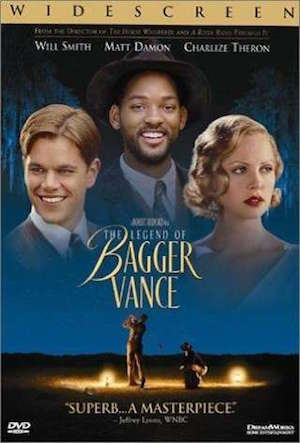 In The Legend of Bagger Vance, we’re told about Rannulph Junuh (played by Matt Damon), a great young golfer who had a promising career as a player until World War I erupted in Europe.
In The Legend of Bagger Vance, we’re told about Rannulph Junuh (played by Matt Damon), a great young golfer who had a promising career as a player until World War I erupted in Europe.
Although he survived the war, he returned home with a lot of emotional baggage after all the destruction and death he encountered on the battlefield. Completely heartbroken and traumatized, Junuh gave in to his own misery and became notorious as the town drunk.
Things change when he’s asked to represent his town in a big golf tournament. At first Junuh rejects the request, but he changes his mind after a mysterious stranger named Bagger Vance (played by Will Smith) convinces him to play.
The movie follows the burgeoning relationship between the two, as Bagger Vance teaches Junuh how to rediscover his swing. What starts as an uneasy link between the two, develops into a more meaningful friendship when Junuh understands that Bagger’s golfing advice is applicable to more than just the sport he loves.
Interesting dialogue occurs between the two throughout the film, as Junuh unravels his outlook on life – tainted by his time fighting in the war. One particular scene reveals this – taking place in the locker room, between rounds at the big tournament.
Junuh is down 12 strokes, and just about out of the competition entirely. Bagger begins telling a story to Junuh about his Uncle Rufus, a man who lost his arms, teeth, and even came close to losing his legs. Junuh gets upset at this “story about overcoming adversity” and discloses his thoughts to Bagger.
-
- Junuh:
“Ah, Jesus. You got an answer for everything don’t you, Bagger? Let me tell you something. There’s no difference between winning and losing and anything in between. What’s lost is lost. A man lives, a man dies. And in the end, it all turns out the same. You’re alone. And that’s all you ever gonna be.”
It’s easy to see that the Great War had totally changed Junuh. He’d once been one of the greatest golfers in the country, but after his traumatic experiences, he was reduced to a shell of a man.
His outlook was clear by his words basically saying: a person is born, the person lives alone, and then the person dies. End of story. In other words, Junuh believed that life was meaningless.
Junuh isn’t the only one to say or believe that. In fact, somebody in the Bible even said it! But there’s one very, very important catch: life is only meaningless if we’re focused on the wrong thing. If we’re focused on God, then life is very, very meaningful!
Let’s talk about that for a few moments:
- Why do you think Junuh had such a poor attitude about life and golf?
- What about you? Do you think life is meaningless? Why or why not?
-
- Read the following passage:Ecclesiastes 1:1-12 (NIV)
“The words of the Teacher, son of David, king in Jerusalem: “Meaningless! Meaningless!” says the Teacher. “Utterly meaningless! Everything is meaningless.” What does man gain from all his labor at which he toils under the sun? Generations come and generations go, but the earth remains forever. The sun rises and the sun sets, and hurries back to where it rises. The wind blows to the south and turns to the north; round and round it goes, ever returning on its course. All streams flow into the sea, yet the sea is never full. To the place the streams come from, there they return again. All things are wearisome, more than one can say. The eye never has enough of seeing, nor the ear its fill of hearing. What has been will be again, what has been done will be done again; there is nothing new under the sun. Is there anything of which one can say, “Look! This is something new”? It was here already, long ago; it was here before our time. There is no remembrance of men of old, and even those who are yet to come will not be remembered by those who follow. I, the Teacher, was king over Israel in Jerusalem.”
- What is some evidence that King Solomon gives to support his theory that life is meaningless?
- Do you find it ironic that King Solomon had this attitude even though he was KING? Why or why not?
-
- Solomon was a King – the wealthiest in his kingdom, with access to anything he could imagine. But clearly even that wasn’t enough.
-
- Solomon’s outlook was obviously pretty negative – but the important distinction to remember here is the phrase “under the sun.” There might be truth in his idea that living in the moment (“under the sun”), rather than for something eternal – is an unfulfilling life.
-
- We see a change of heart, however, as Solomon closes his book. Near the end of his life, his attitude changes and he remembers the God he once loved and served. He remembers what his life was supposed to be about – pleasing God, not himself – and he gives some great advice.
-
- Read the following passage:Ecclesiastes 12:1-2 (NIV)
“Remember your Creator in the days of your youth, before the days of trouble come and the years approach when you will say, “I find no pleasure in them”– before the sun and the light and the moon and the stars grow dark, and the clouds return after the rain.”
- Have you ever chased after something earthly – like King Solomon or Junuh did – only to be disappointed? If so, what was it?
- Why does Solomon say to remember God when we are young? Why is that important?
- It seems as though King Solomon’s attitude changes when he “remembers God.” Why is that? Why does a pursuit of God have such an impact on our life?
- Is your life purposeful and filled with meaning? If so, why? If not, why not?
- What would have to change for your life to be filled with meaning?
In the movie discussed, we heard Junuh say that life was pretty much pointless and meaningless. He summed it up by saying, we’re born, we live alone, and then we die. Pretty grim prognosis. His caddy, Bagger Vance, tells him that’s a stupid outlook on life. In fact, he says it’s the most foolish thing he’s ever heard.
Bagger Vance didn’t go on to give Junuh the truth, partly because Junuh stormed out of the locker room. But fortunately for you and me, we got a healthy dose of truth from King Solomon in the Book of Ecclesiastes. In his writings, Solomon starts reflecting that life is meaningless.
But once he remembered the God of his youth – the God he once loved, the God who had given him his throne – he realized that his pursuits of all those other things had led him nowhere. Meaning could not be found in food, wine, friends, work, money, sex, long life, or anything else on the planet. Meaning could only be found in God.
That’s the simple, but profound, message in the Book of Ecclesiastes. I want that to land on your heart today. If your life has true meaning, it’s because you serve God with it. If your life doesn’t have meaning, it’s because you don’t serve God with it.
So take a long hard look at your life for a moment. Are you filled with purpose? Do you have a reason to wake up each morning? Do you know Who defines you? Are you filled with joy – not happiness, but joy – because of what God is doing through your life?
Don’t let your life go one for another meaningless day.
Jonathan McKee
Jonathan McKee is the author of over twenty books including the brand new The Guy's Guide to FOUR BATTLES Every Young Man Must Face; The Teen’s Guide to Social Media & Mobile Devices; If I Had a Parenting Do Over; and the Amazon Best Seller - The Guy's Guide to God, Girls and the Phone in Your Pocket. He speaks to parents and leaders worldwide, all while providing free resources for parents on his website TheSource4Parents.com. Jonathan, his wife Lori, and their three kids live in California.



